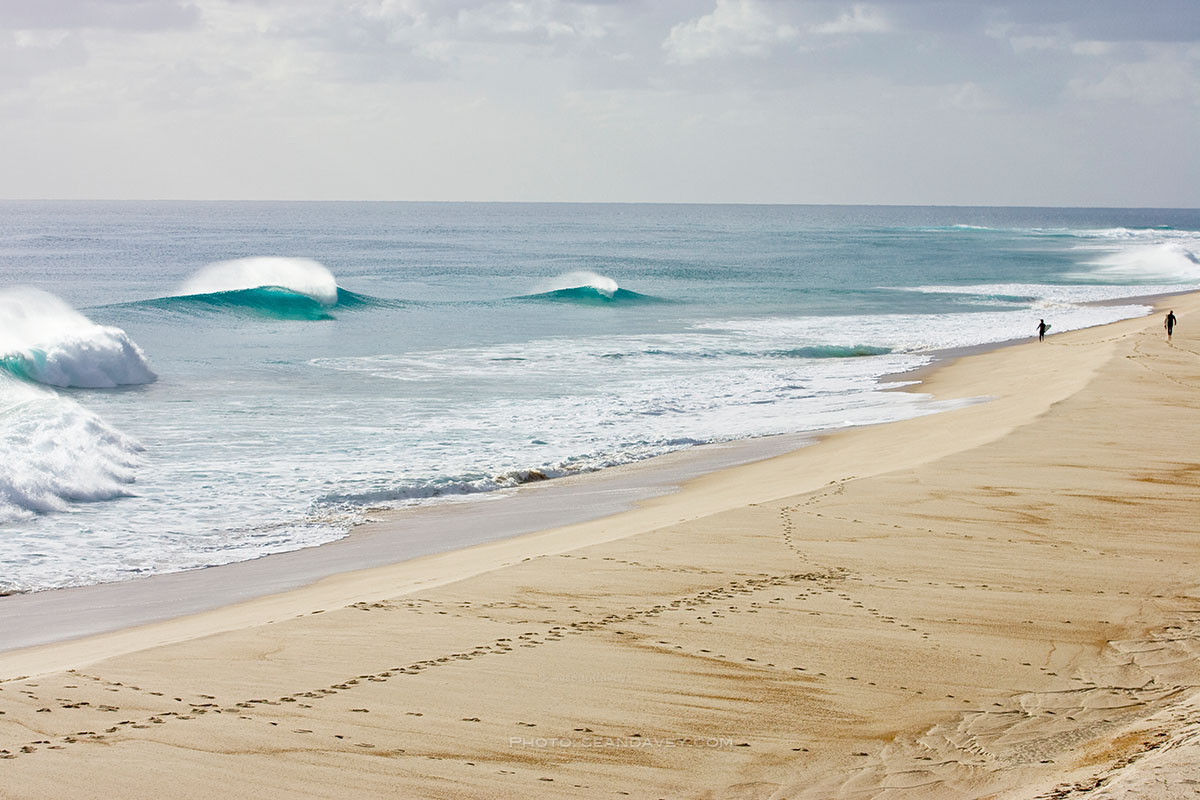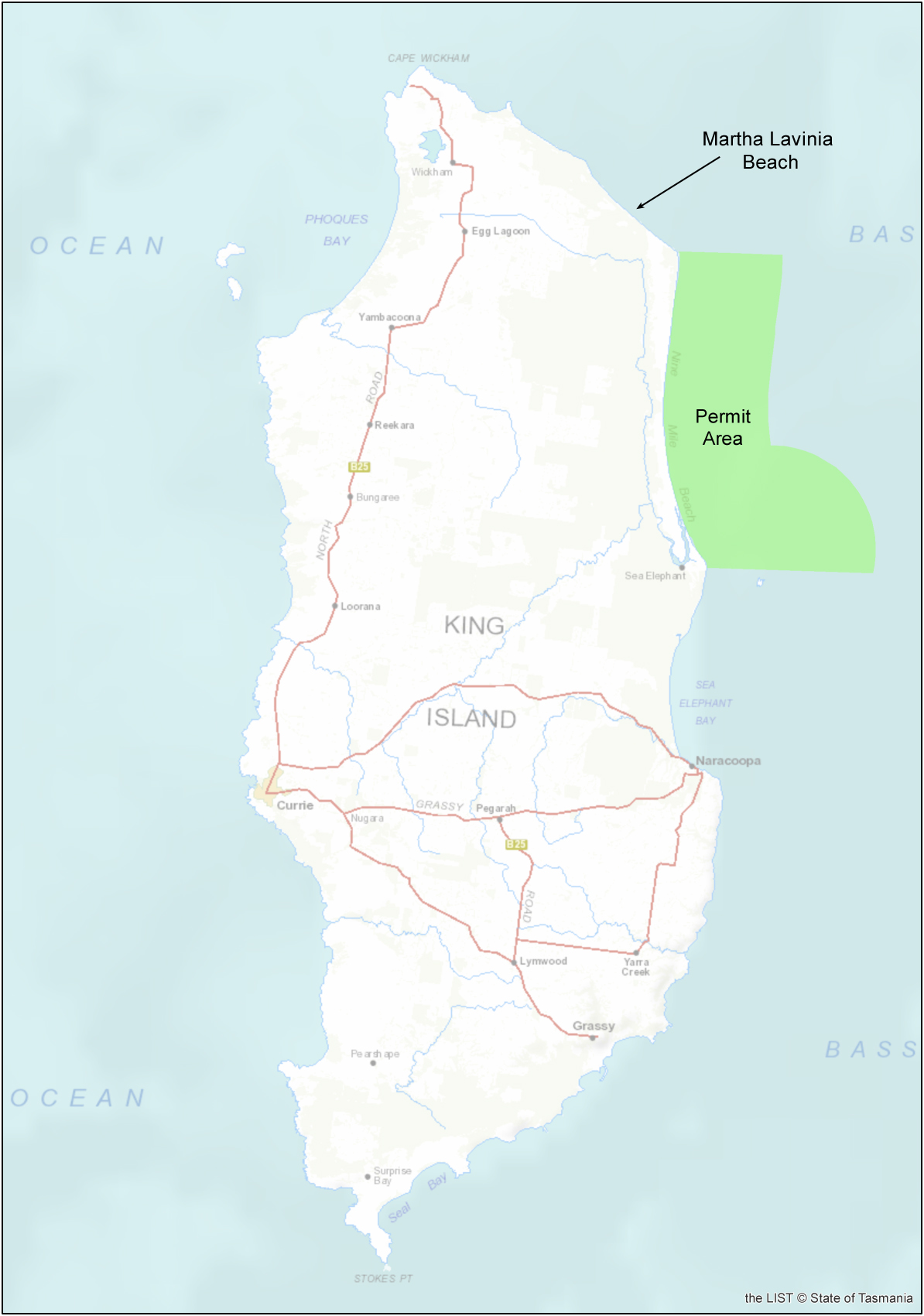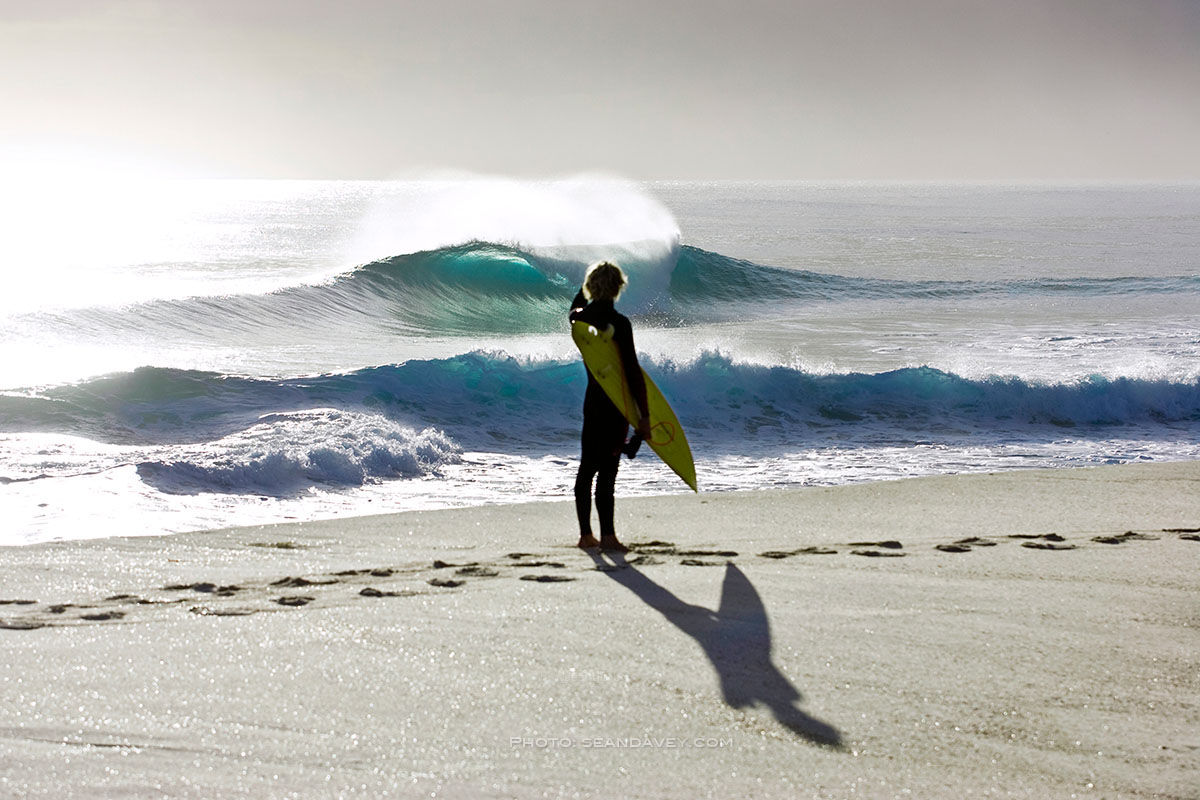One Of Tazzy’s Best Beachies Under Threat
Proposed salmon farming has one of the country’s favourite waves in jeopardy.
King Island, located in Bass Strait, off the north-west coast of Tasmania, is home to some of the world’s most pristine, untouched natural landscapes.
King Island is also home to Martha Lavinia beach, a break which consistently serves up some of the dreamiest wedges you or I will ever lay eyes on (see: Craig Anderson’s ‘Welcome Elsewhere’ below for a glimpse).
When Tom Carroll refers to King Island as being home to some the “most beautiful beach breaks he’s ever seen”, you know there’s something inexplicably special about the place.

Martha Lavinia Beach, King Island. While a lineup like this is a rare sight for the majority of us, the blessed King Island frequently produces this rich of eye candy.
Photography
Sean Davey
Unfortunately, the immaculate beaches and world-class waves are currently under threat, with the proposal of an offshore Tassal salmon farm being considered. The proposed farm would be located marginally offshore of the island’s east coast, inconveniently just south of Martha Lavinia. Aside from obvious environmental concerns, the farm’s proposed location would directly block the flow of south swell to the region and potentially stifle the beach’s current world class waves, which are dependent upon a mix of swells from both the north and south. Therefore, the whole deal poses a significant threat to the area’s consistency and quality, surf-wise.
At this stage, the Tasmanian Government has granted Tassal access to the area for ‘investigating and monitoring purposes’ (depicted below). Tassal has informally indicated that they are currently unsure of the impacts that a farm would have on incoming swell and have implied that they would not construct a farm if local swells were to be substantially affected.
However, Tassal’s and the salmon farming industry’s previous environmental record is tarnished, to say the least, by the negative impacts their farms have had in other regions, such as Tasmania’s Macquarie Bay – which received in-depth coverage on the ABC’s Four Corners, Big Fish.

A map of King Island which highlights the permit area and the location of the under threat Martha Lavinia beach.
Photography
Source: Tasmanian Government Website
Salmon farming is a multi-million-dollar industry and Tasmania is a hot spot for the fishing and farm manufacturing of salmon. The ABC’s Four Corners program estimated in 2016 that the salmon industry was worth upwards of $700 million, with Tassal themselves generating an annual revenue greater than $430 million dollars.
These numbers are only projected to climb as the demand for salmon products increases, meaning the number of farms must increase to accommodate the demand.
At this early stage, the proposed Tassal farm is estimated to contain up to 22 individual pens, which would house around 1 million salmon. However, even if Tassal decide to stop development, the government’s current permit would leave the door open for other farming companies, Petuna and Huon Aquaculture. Huon Aquaculture uses pens of up to 240m in circumference (a more environmentally friendly approach), which equates to a space of over 5 kilometres of swell corridor being blocked if 22 pens were to be used.
Moreover, while it is too early for the confirmation of exact details, there are rumours that the local Naracoopa wharf will be used to accommodate the salmon farmers on land – rather than using entirely offshore facilities such as ships and barges.
In addition to the considerable impact the farm may have on the area’s wave quality, there are also serious broader environmental concerns for the region’s ecosystem.
The sheer quantity of fish that would be housed would lead to an inundation of untreated excrement, as well as the presence of excess fish feed pellets in the water. The David Suzuki Foundation has previously estimated that the average salmon farm produces an average sewage output of 7,500 people – significantly more than King Island’s current population of ~2000.
One consequence of increased faecal matter is the reduction of oxygen levels, both in sediment and water. This reduction in oxygen poses issues for other species in the region, as well as the farmed salmon themselves.
This is not mere speculation. See: Macquarie Harbour in Tasmania. In May of 2015, 85,000 farmed Petuna salmon suffocated and died as a result of considerably low oxygen levels in the Macquarie Harbour, Tasmania.
Others in the area, such as Dover Bay Mussels, lost the entirety of their business due to diminishing water quality throughout the harbour and surrounding waterways.
Salmon farming is often promoted as clean, green, and ethical, or hailed for its considerable health benefits. Yet consumers are often unaware of what, truly, went into their salmon, or of the money exchanged for WWF and ASC approval logos (i.e., an agreement of $250,000 per annum between Tassal and WWF).
Studies have also shown that salmon farming introduces large quantities of faeces, urine and organic matter from net cleaning. The chemicals involved in this waste are generally forms of carbon, nitrogen and phosphorous. The ongoing consequences of the presence of these compounds range from minor health issues to problems as severe as releasing toxic methane and hydrogen sulphide gases – leading to decreased fish growth and higher mortality rates.
Environment Tasmania has been pushing for stricter regulations on the industry in response to the adverse environmental impacts witnessed in regions such as Macquarie Harbour. They have also published a scientifically supported document titled, ‘Cleaning Up Tasmanian Salmon’, which outlines the impacts of improper farming methods, as well sustainable, evidence-based practices. But at this stage, these are only recommendations and are not enforced by law.
In order to try and prevent Martha Lavinia beach potentially suffering the negative consequences of salmon farming, the Surfrider Foundation Australia has compiled a list of impacts the proposed farm may have in the area. Additionally, they have started an online petition against the proposed salmon farms, which you can sign here.
Several prominent surfers have also stepped up in public opposition to the proposed developments:
“This precious piece of coastline on our beloved King Island should simply be kept as nature intended it to be,” said Brendan ‘Margo’ Margieson. “Please don’t mess with this untouched area.”
Tom Carroll released a video on the Martha Lavinia Beach facebook page in disapproval of the planned farms. Barton Lynch, the beloved ’88 World Champ, turned WSL’s token frother, has also publicly voiced his concerns regarding the salmon farm development on King Island.
“Please support the people and surfers of King Island by getting behind the campaign to prevent the development of a salmon farm along this pristine piece of coast, right by one of the best beachies I have surfed,” Barton said. “ The fact that somewhere still exists that has changed less than almost everywhere else and is known for its natural wealth and beauty is so important and valuable.”

A sight for sore eyes if we’ve ever seen one.
Photography
Sean Davey
Unfortunately, in the modern economic environment, profit consistently trumps all other concerns. Environmental and ethical matters are recurrently at the bottom of company’s priorities and are often seen as an obstacle to profit, rather than an inherent concern.
With regards to surf spots, there are many examples to point to, the majority of which follow the all too common tale of nature vs. corporations. Fallen Atlantises like Barra De La Cruz or Jardin do Mar, or threatened icons like Punta Lobos and the Gold Coast, to name a few.
Thankfully, it isn’t always the dollar bill that wins. Look at the recent revocation of the Australian government’s funding of the Adani coal mine – which was undoubtedly influenced by people’s interests and environmental concerns for the Great Barrier Reef.
The purpose isn’t to promote a radical ideology for the removal of all salmon farms or to tear down agribusiness. What is crucial, is that when plans and developments are made by companies, that environmental and ethical issues are at the forefront of their priorities.
What people are asking of salmon farming on King Island, is for the companies to find more suitable locations, and to strive to minimise their environmental impact to the highest degree.
Thankfully the development plans are only in their first approval stages, so it most certainly isn’t too late for prevention. If you’re environmentally inclined or just wish to see more footage of Martha Lavinia, sign the petition, spread the word, or barrage the Tasmanian Government with disapproving emails.





Comments
Comments are a Stab Premium feature. Gotta join to talk shop.
Already a member? Sign In
Want to join? Sign Up